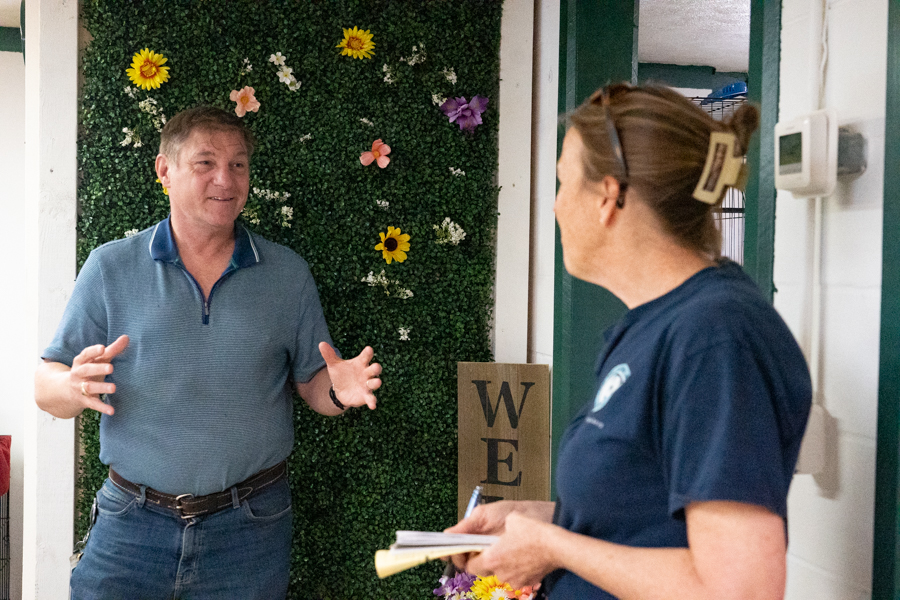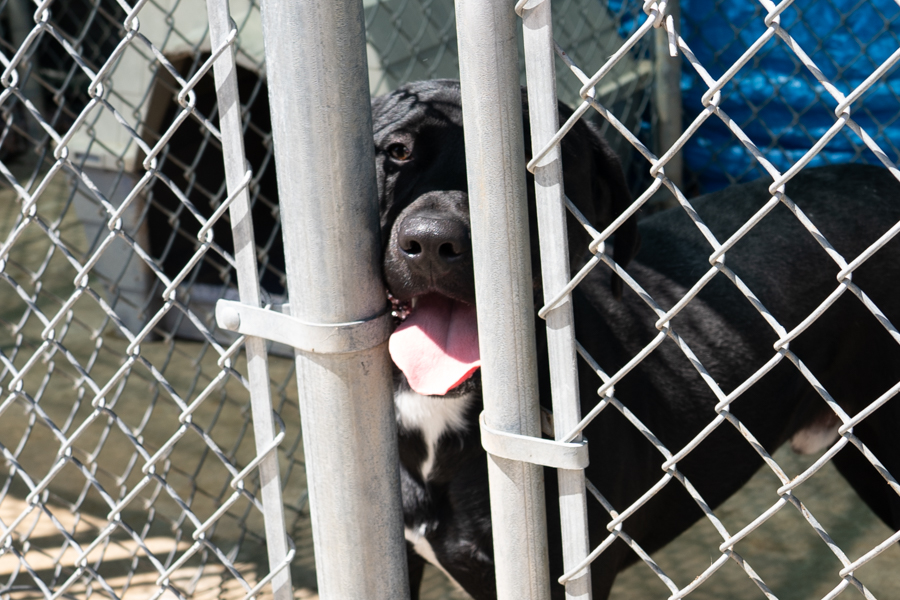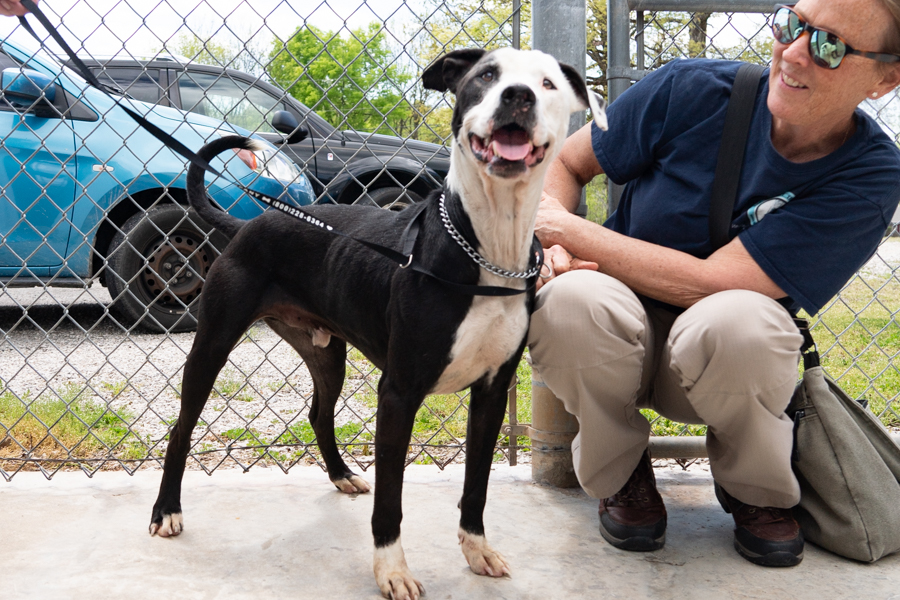We see a lot of hard situations on shelter tours, but sometimes what we see is flat-out inspiring. That was the case with Meade County Animal Shelter, a small municipal shelter in rural Brandenburg, Kentucky. They are proving that with leadership, community engagement, and veterinary access you can turn a kill shelter into one that is saving all the adoptable animals in less than a year.


For at least the last fifteen years prior to summer of 2023, the Meade County shelter was essentially a dog pound where all dogs who were not reclaimed by their owners were euthanized after their five day legal stray hold was up.
In Kentucky, authority for the animal shelter falls under the direction of the Judge Executive, an elected position. A new Judge Executive, Troy Kok, began work in Brandenburg in January 2023. When he was running for office, he heard from many concerned citizens about the sad situation at the shelter, and when he began work it was a priority on his agenda.

Judge Kok brings over 37 years of military experience to the job. One of the first things he did was form an animal advisory board comprised of a dozen citizens with shelter/animal expertise to advise him on how to turn the shelter around.
And then he did just that.
He hired a director/ACO (Jenn), a deputy director/ACO (Ashley), and an administrative assistant/vet tech/kennel attendant (Savanna). Jenn, the new director comes from a wildlife rehabilitation background, but she has quickly stepped into her new role assuring that animals get the best care. Despite only working together for a few months at the time of our visit, the three women already seemed like a solid team committed to giving the animals the best care and engaging their community in the shelter’s work.



The budget for veterinary care for the last fifteen years had never been touched. There was no need to offer medical care or spay/neuter to animals you planned to kill. Jenn has been working at the shelter for eight months and has already spent it all.
Dogs are no longer euthanized at the end of their stray hold. Instead, they are showered with attention from the staff and growing pool of volunteers, featured on their Facebook page and at adoption events, and matched with appropriate adopters. All dogs are now vaccinated on intake, microchipped, dewormed, treated for fleas/ticks, tested for heartworm, and spayed/neutered before they are adopted.



There is a new energy at Meade County, the enthusiasm for the dogs and the future of the shelter is palpable. Their current building (circa 1978) is set up like a traditional dog pound. The indoor kennels are small, dimly lit, and LOUD. Outside there is a larger open cement enclosure with spacious chainlink kennels along two sides. The outside dogs have a little more space/light, but they are living in the elements. Savanna tries to put together playgroups in the outdoor open area, but with limited space, it’s a challenge. The dogs’ feet don’t touch grass unless someone takes them for a walk.








Judge Kok explained that one of his goals is a new shelter, and not just any shelter building. “I want it to be the best shelter in Kentucky.” With the help of his animal advisory committee, and volunteers like Cheryl and Connie (who invited us to visit), he is already researching designs with the aim of building a shelter that will be functional, and have the space and design to serve the community for fifty years.
Judge Kok is a dog lover himself. “I love big dogs,” he says before telling us about his three dogs. His smile as he talks about them makes it clear they aren’t just animals, but furry members of his family. “How we take care of our animals is how we take care of our people.” Ghandi said something very similar.
Judge Kok is working with the staff and the animal advisory board (and Jordan, the new grant writer for the county) to develop standards of care and protocols that will ensure the shelter will serve the animals and the community well beyond his tenure in Meade County. “If it can continue without me, that’s the definition of success.”

In many places animal services fall under an elected position (often the sheriff), so Judge Kok’s idea of success is something critical to solving this country’s shelter problem. There have to be systems and policies in place that guarantee that life saving measures and community support will continue no matter who is elected. We saw the absence of that while on that same tour in Helena-West Helena Arkansas where one mayor signed a contract for a new shelter (donated by the Bissell Pet Foundation) and a few months later the new mayor axed the idea.
Turning the Meade County shelter around has led to a partnership with the 501(c)(3) group, Pets in Need Society, who have been advocating for animals in the county and paying to spay/neuter community animals since their inception 23 years ago. They are involved in supporting the shelter in many ways, including fundraising and spay/neuter work. The PINS vice-president Dave joined us for the visit. He’s thrilled with the changes at the shelter and excited about working with Jordan on grant initiatives, giving the shelter twice the possibilities since the nonprofit can apply for grants on behalf of the municipal shelter.


It was exciting to hear the plans for the shelter and see the enthusiasm of the staff, volunteers, and administration. This is how shelters should be run—with inspiring leadership who hire and entrust qualified and passionate shelter staff, engage their community in the shelter’s work and mission, and network with other shelters and resources to create a shelter that serves its community and seeks the best possible outcome for the animals in their care.
If you’d like to give a boost to this inspiring shelter, consider shopping their Amazon wishlist: https://www.amazon.com/hz/wishlist/ls/EVCZEI9U4FM8
And if you live in a place where your shelter and community is still struggling, reach out to shelters like Meade where they are quite literally writing a new story for their shelter. As another animal advocate, Aubrey Kavanaugh writes (in her book by the same name): It’s not rocket science. With common sense and committed people, change is possible. We CAN let the dogs out.

Until each one has a home,
Cara
If you want to learn more, be sure to subscribe to our email list to get the latest stories and solutions delivered to your inbox. And help us spread the word by sharing this post with others. Visit our website to learn more.
Our Annual Online Auction is coming up in September. Check out what we’ve got so far (and register to bid). If you’d like to donate an item, preferably something easy to ship (like gift cards, tickets and/or e-certificates) or something you will ship yourself, reach out. Contact Cara@wwldo.org.

You can also help raise awareness by following/commenting/sharing our content on Facebook, Instagram, YouTube, and Tik Tok.
To see our Emmy-nominated, award-winning short documentary, Amber’s Halfway Home, click here. If you’d like to see it on the big screen (along with other short dog films), check out the tour schedule of The Dog Film Festival, currently in art movie houses all over the country.
Learn more about what is happening in our southern shelters and rescues in the book, One Hundred Dogs & Counting: One Woman, Ten Thousand Miles, and a Journey Into the Heart of Shelters and Rescues (Pegasus Books, 2020). It’s the story of a challenging foster dog who inspired me to travel south to find out where all the dogs were coming from. It tells the story of how Who Will Let the Dogs Out began. Find it anywhere books are sold.
For more information on any of our projects, to talk about rescue in your neck of the woods, or partner with us, please email cara@WWLDO.org.
And for links to everything WWLDO, including volunteer application, wishlists, and donation options, check out our Linktree.



David Hatfield
The shelter is worlds better than it was but, contrary to your statement of fact, over the last seven years my family has personally spent over $30,000 on medical care for the animals in the shelter. We also have found rescues and adopters for thousands of animals during this time and have personally kept dozens of dogs and cats that were too old and/or ill to be adoptable. And we mourned each one when their frail, old bodies wore out and they passed.
This isn’t to lessen the accomplishments of the current administration and staff. But please be aware that there was a handful of county residents that did everything they could to save as many animals as we could.